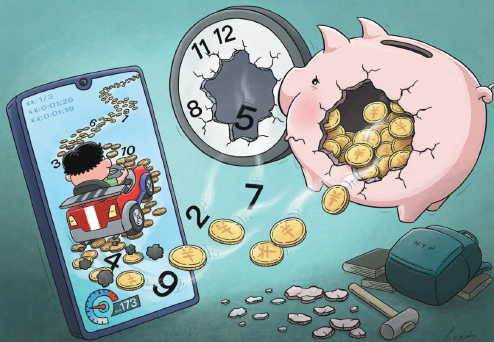Tackling online addiction among minors is not a game
Curbs can help, but stricter adult oversight also needed, Deng Zhangyu reports.


Every parent knows that children have an innate ability to surprise. The era of modern technology provides ample opportunity for creative mischief. Certainly, as a father of a 9-year-old boy, Guo Liguan was shocked, and no doubt proud, to find that his son is much smarter than his expectations. In fact, the boy hoodwinked his elders by using his grandmother's image to pass a facial recognition check required by a video game. He got her image in the first place by indicating that he just loves taking pictures of her.
"I never thought my son would have the idea to bypass the real-name authentication that limits playing time on games," says Guo, an engineer in Shanghai.
After the government issued strict regulations on video games to limit the youngsters' playing time to three hours a week on Aug 30, tricks to bypass the curbs, like those used by Guo's son, have been employed with greater frequency and been noted online.
A 60-year-old "elderly lady" playing video game at 3 am and getting stunning scores went viral recently.
It's widely suspected that the real player behind the early morning endeavors is a child who uses his grandmother's ID to log on. Businesses that rent and trade adult game accounts on e-commerce platforms have seen a massive surge.
On Sept 8, the Publicity Department of the Communist Party of China Central Committee and the National Press and Publication Administration called a meeting attended by game companies to tell them to resolutely enforce the rules on minors and ban trading and renting accounts to people under the age of 18.
Guo says that, as parents, they support the series of guidelines the government has issued.
During the summer vacation, Guo found that his iPad and cellphone, when left at home, ran out of power rather frequently. He then hid the charging cables. You could almost feel sorry for the innocence of parents. His son, not to be deterred, used his grandmother's cellphone to play games online, telling her, and this has the hallmarks of genius, that he had to study English classes online.
"He seems to use all his wits to find the solution on how to play games without our supervision," Guo says.
Under the new government restrictions, children are allowed to play games between 8 pm and 9 pm on Fridays, weekends and on public holidays, which many parents like Guo regard as very reasonable.
"I never tell my son not to play online games. That's part of the social language he has with his friends," says Lu Bingyan, a mother of a 7-year-old boy who is in second grade in a primary school in Beijing.
Lu has set a strict timetable for the boy: no games on weekdays, half an hour a day on weekends and one hour or more on holidays. The government's curbs on gaming seem to be almost identical to Lu's own guidelines.
"When I was a little girl, I also played games and watched TV dramas, both of which were not allowed by my parents," says Lu, recalling that the hours of entertainment seemed like a secret life she shared with her peers.
Lu says the boy was never actually prohibited from playing video games, because his generation is growing up in the age of the mobile internet. To spend a reasonable time on games is critical and all the government is trying to do is prohibit children from overindulging in the pastime, the mother says.
According to a report on Chinese children's use of the internet in 2020 issued by China Internet Network Information Center in July, the number of underage internet users reached 183 million, and 94.9 percent of juveniles had access to the internet. More than half of gamers are minors, and primary school students make up the majority, accounting for 53.5 percent.
Lu says that, in big cities, students have to deal with their homework and take part in extra activities. They don't have much time left for games. Lu's son has to learn swimming, basketball, painting and violin at weekends.
"If he has more time, I will take him to other courses to learn as much as possible," she says.




































